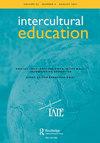世界观素养是教师专业素养的一部分
IF 0.8
Q3 EDUCATION & EDUCATIONAL RESEARCH
引用次数: 1
摘要
摘要本文基于一项混合方法研究,考察了一组(N = 134)芬兰学生和在职教育工作者在解释日常学校生活中的一个书面想象案例时。这些发现是在世界观素养的框架下解释的,该框架源于宗教素养的概念,并被定义为解读具有世界观多样性的情况的能力。从对调查的公开回应中获得的数据有两种方式:定量地,世界观素养被视为识别世界观在案件中的影响并为其辩护的能力;定性地,分析参与者提到的世界观的不同方面。在定量分析方面,调查显示,人们倾向于避免用世界观来解释情况。从定性的角度来看,参与者最常提到的世界观是信仰和深刻意义和情感的东西。此外,这些数据还提出了关于本质主义者对世界观和文化的态度以及对权力问题的认识的问题。基于案例的开放性问题产生了多方面的数据,表明这种方法可以用来衡量世界观素养。本文章由计算机程序翻译,如有差异,请以英文原文为准。
Worldview literacy as a part of teacher professionalism
ABSTRACT This article, based on a mixed-method study, examines which dimensions of worldview are addressed by a group (N = 134) of Finnish students and in-service educators when interpreting a written imaginary case from everyday school life. The findings are interpreted in the framework of worldview literacy, derived from the concept of religious literacy and defined as an ability to decipher situations with aspects of worldview diversity. Data from open responses to a survey were approached in two ways, quantitatively, where worldview literacy was seen as an ability to recognise the impact of worldview in the case and argue for it, and qualitatively, where the different aspects of worldview mentioned by the participants were analysed. In terms of the quantitative analysis, the survey revealed a tendency to avoid explaining situations through worldview. From a qualitative point of view, the participants most often mentioned worldview as beliefs and something deeply significant and emotional. Furthermore, the data raised questions about essentialist attitudes towards worldviews and cultures, and recognising power issues. The case-based open question yielded multifaceted data, pointing to the fact that this method could be developed to measure worldview literacy.
求助全文
通过发布文献求助,成功后即可免费获取论文全文。
去求助
来源期刊

Intercultural Education
EDUCATION & EDUCATIONAL RESEARCH-
CiteScore
2.30
自引率
8.30%
发文量
36
期刊介绍:
Intercultural Education is a global forum for the analysis of issues dealing with education in plural societies. It provides educational professionals with the knowledge and information that can assist them in contributing to the critical analysis and the implementation of intercultural education. Topics covered include: terminological issues, education and multicultural society today, intercultural communication, human rights and anti-racist education, pluralism and diversity in a democratic frame work, pluralism in post-communist and in post-colonial countries, migration and indigenous minority issues, refugee issues, language policy issues, curriculum and classroom organisation, and school development.
 求助内容:
求助内容: 应助结果提醒方式:
应助结果提醒方式:


